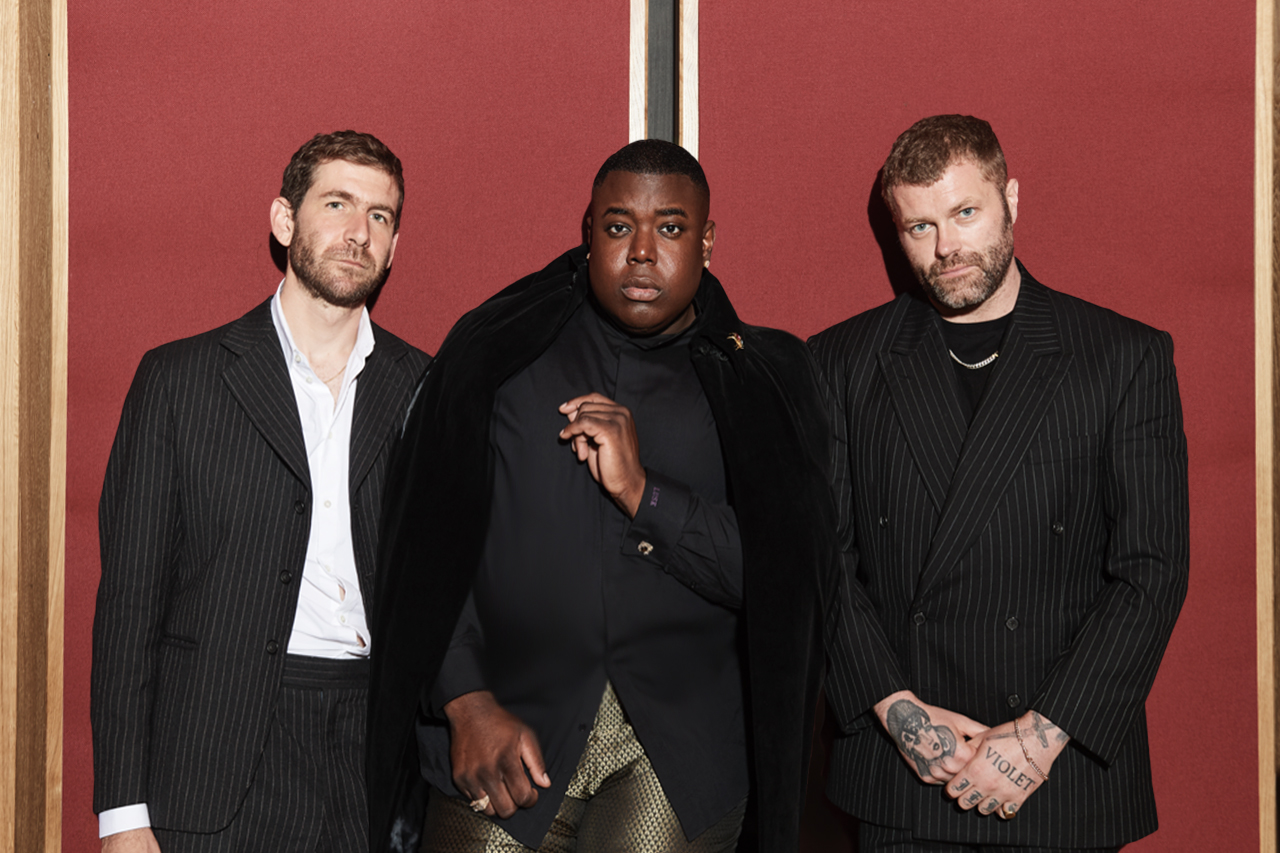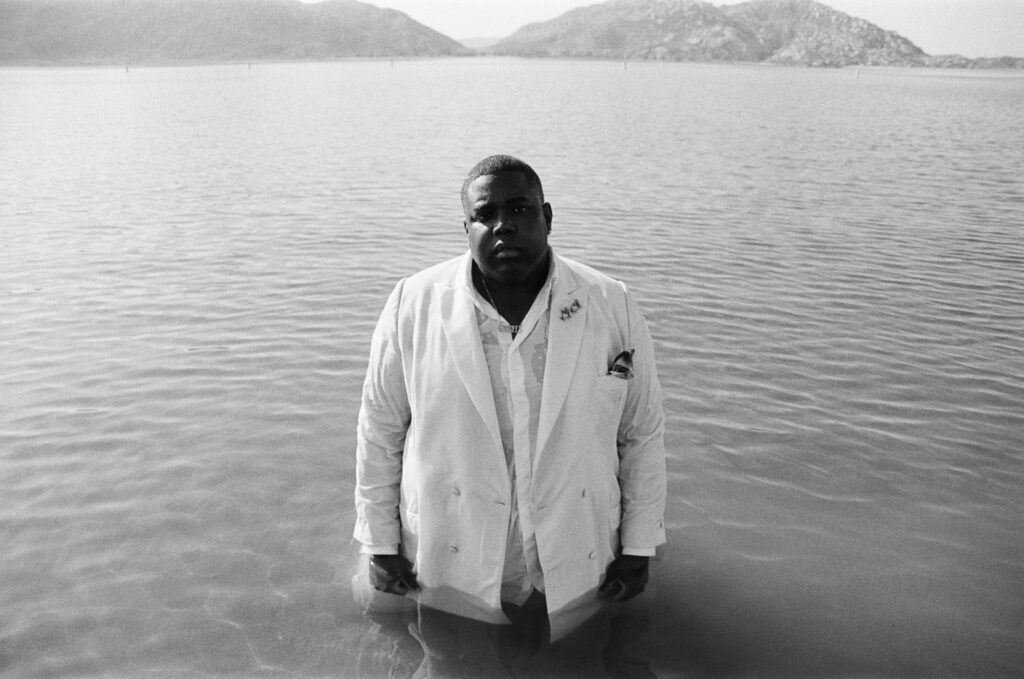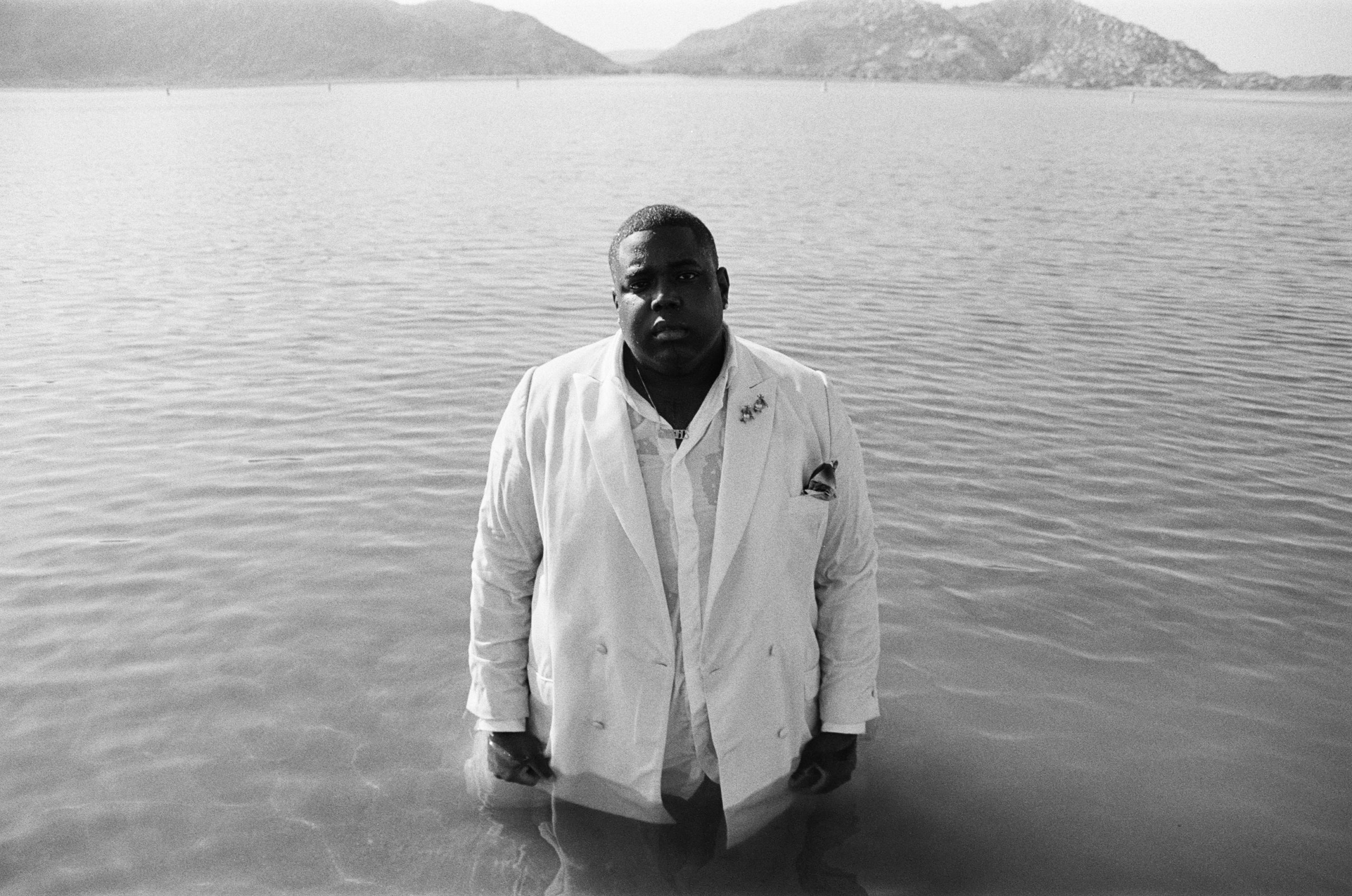You’d never guess by his heavenly vocals, but Jacob Lusk wasn’t always a singer. One third of trio Gabriels—made up of Lusk, violinist-composer Ari Balouzian, and producer-keyboardist Ryan Hope—the Compton-born artist grew up practically banned from the stage. Raised in the church, the vocalist listened to gospel and jazz, sprinkled with legends Nat King Cole and Gladys Knight, but his own musical journey was one met with resistance. “I didn’t sing at church because I was terrible as a child,” he says, laughing. “They didn’t let me. Can you believe that?” For an artist whose early releases caught the eye of Elton John (not to mention the trio opens for Harry Styles’ Austin residency tour this week), we can’t say we do. Regardless, the singer now stands at the other side of a stunning transformation, fronting the raw, soulful tracks of Gabriels’ debut album, Angels and Queens Part 1.
“A lot of times when you’re going through things, you feel like you’re the only one going through them,” says Lusk, whose recent hardships—combined with Balouzian and Hope’s—span from losing parents to grieving relationships. “[There’s] a realization that these things happen, but they don’t define us.” Angels and Queen Part 1 was derived from that pain, a fusion of fantasy and reality where the three could process a world in constant change.
It happens like this—in a room to themselves, the trio immerses themselves in someone’s story, real or imagined. Melody and lyrics evolving simultaneously, a common thread begins to form, somewhere between the group’s own experiences and other taboos of loss and abuse. Channeling thoughts into writing, an album is born (two, if we include Angels and Queens Part 2 releasing early next year). Overflowing with heart, chilling vocals, and some expertly played violin, this release is nothing if not glorious, and it isn’t one to miss.
Keep reading for more on our conversation with Jacob Lusk as he shares more on his musical journey, the formation of Gabriels, and the making of Angels and Queens Part 1.
VMAN: Congratulations on the album, Angels and Queen Part 1! This is the start of such an exciting chapter for you guys. Let’s take it back to the early days of this project. What did that process look like for you?
JACOB LUSK: All of us have experienced a lot of loss during this process. Ryan lost his mother, I lost a few friends. Covid happened, went away, and came back. Then monkeypox. This is life, and life is crazy for everybody. A lot of our relationships changed. I think that’s everyone’s story, right? Friendships, relationships, family—everything’s a little different now, and we just started writing songs. That’s where it started and now we have this little baby that’s coming out in two parts. We ended up working with a guy named Sounwave who has produced Kendrick Lamar and Beyonce, and now us. It’s been a really exciting time and it came faster than we thought it was going to come. But the universe, the world, God, would have it this way. I’m excited.
VMAN: That’s definitely true. Do you think that the creative process felt like an escape from everything going on? A way to process it?
JL: It was a way to process, for sure. One of the songs that’s on Part 1 is about my god sister. We were in the middle of writing the album, trying to write before we went back to the UK, and I got the news that she had passed away. She had struggled with addiction, and “If You Only Knew” is actually about her. We wrote the song from the other side of loss. How as sad as it is, it can be freeing. Ryan’s mom, she had cancer, and she passed as well. I think we always have this fear of, “We lost them too soon, how are we going to move on?” And for them, maybe they’re at peace. Maybe they’re like, “Alright, baby, now you go and keep living and keep growing.” They wouldn’t want us to die, they would want us to keep going. That’s where that song came from.

VMAN: Sorry to hear that. Does every song have its own story behind it?
JL: Yes, all the songs have these amazing stories. Taboo is about a relationship. I won’t say who, but I got involved with somebody in the industry and it was not good. What me and the guys realized from it was that even though we’re very different, there are more things that make us alike. I’m this big, black, bigger than life character. Ryan’s this tattooed guy from Sunderland, who’s all intense. Ari wears sweaters and turtlenecks. He looks like Harrison Ford, or George W. Bush, whichever you prefer—We’re very different but we have these common ties. We all were experiencing loss during this time, even in relationships. Ari got into it with this chick, and it was like, “Oh, we’re all going through the same things.” So, these are my stories, and our stories. The reality is, these are situations that we’ve all been through. That’s really what the album is. All the songs are like that.
VMAN: That’s great, the way this message comes from all of you. When it comes to the writing process itself, how does that dynamic work between the three of you?
JL: Sometimes I’ll have an idea, or we’ll have a musical idea and it’ll start there. We do our best to wait until we get a room to ourselves, and we’ll put ourselves in the story of whatever happened. Once you get in the story, the song just comes, like with my god sister. Clearly that was a more direct thing, but some of them aren’t. There’s a song in the album called Mama, it’s the last song, and we wrote it after we found out Ryan’s mom had cancer. The song says, “Mama, don’t you cry, it’ll be alright”. Then it shifts to talking about a woman who is in an abusive relationship and can’t get out. She’s packed her bag; she’s bought a ticket. We literally put ourselves in the room, as I was singing and as we were writing it, exactly what the room looks like. The friend outside the window waiting for her to come down, but she never comes. If I think about my own personal life, I haven’t been in an abusive relationship that I couldn’t get out of, but I’ve been in other situations I thought I couldn’t get out of, or too scared to make a jump. I was too scared to quit my job and sign a record deal for Gabriels. Nobody knows that.
VMAN: So would you say that each song is a story that morphs from reality into these more abstract concepts?
JL: Exactly.
VMAN: That’s so special, how personal is it to you all but also relevant to your listeners. When it comes to Ryan and Ari, I heard you met years ago at an audition for them. Can you tell us that story? How did we get this trio out of what was once three strangers?
JL: It was for a choir actually, and I wasn’t going to do it because I thought I was hot shit at the time. My aunt convinced me, so I went, but I didn’t even sing. I just directed the choir. They booked the choir that went to Ari’s studio on the Westside to do an acapella session, and I didn’t go. But in true Ryan fashion—Ryan’s going to do whatever the fuck he wants—they show showed up that Sunday, two days later. When church was over, they set up a remote studio in the choir room, and were like, “Hi, we’re here to get you to sing.” I did the arrangement in 15 minutes, and I did all eight or nine parts: the soprano part, the tenor part, the bass part. They were like, “Who the fuck is this guy?” and we became friends. We started making music for fun, never thinking it would turn into this. We did a show for a club, then Covid happened. We were like, “Let’s just put out some music,” and Elton John got a hold of it.
VMAN: That’s amazing. When it comes to the actual sound, you have such a timeless, vintage, gospel feel. Do you have musical inspiration for this album in particular?
JL: Here’s what I say, I say if Nina Simone made a pop record in 2052. A lot of people think we’re trying to capture the old sound and we aren’t necessarily. Ari just plays the viola so we’re gonna have strings. I grew up in church, that’s why you hear a little gospel, but I was doing R&B and jazz. And of late, I’ve been singing with orchestras. My vibe is very different. I’m a huge Tina Turner fan and I also love Beyonce. I stan Nicki Minaj and Cardi B, I stan a lot of people. There’s a mixture of those things. Getting my start in the industry I was actually a hype man for a female rapper, and then I worked with Nate Dogg. I did that full time. It’s a culmination of our experiences more than it’s us trying to make it old school. When we decided we’re going to make the best music we possibly can, that’s what came out.

VMAN: Do you find yourself reaching for inspiration from your childhood experience with music in the church or other early musical exposure?
JL: Here’s the thing, I didn’t sing at church because I wasn’t very good. I was terrible as a child. You can ask the people; I was not good. They didn’t let me sing, can you believe that? My first inspirations were gems, they were Nat King Cole and Nina and Gladys Knight. Those were my first inspirations. Then when I got to college, my mom was like, “The singing shit, you’re not doing that. You’re gonna take your ass to school.” I think I was in a chamber group my last year or two of high school and then I started doing classical music. For me it always had to be logical: “If I go to school, I get a degree, I can be an opera singer.”
VMAN: If you weren’t singing early back then, what do you think you as a kid would think of what you’re doing now?
JL: Now here’s what’s interesting, my kindergarten teacher who my mom is friends with said that when I was younger, I used to say I wanted to be a singer and they would tell me that I couldn’t. I would lay out in the floor and kick and scream. I don’t remember that ever happening, all I knew was I was going to be an OBGYN. I was going to bring babies into the world, that was my thing. I think if I saw myself I’d would be like, “What are you doing? Good luck with that.” I would give myself a very hard time. “That’s the best you could come up with? No education, 30, and a college dropout?” I would have been a total prick.
VMAN: That’s surprising! Do you think the creativity of making music is what’s changed you so much since then?
JL: Yes, I think making music is the most authentic I’ve ever been. As a person, as a performer, musically. Now, if I think it, I do it. It’s been freeing.
VMAN: That’s amazing. Moving back to the album, of course Angels and Queens Part 1 leaves us waiting for Angels and Queens Part 2. What about this project made it feel more fit to be a multi-parter? Why not release it all in one?
JL: A couple reasons. First, people were waiting for music, and I got tired of making them wait. We’re also singing a lot of these songs live, so if we’re singing these songs then people need to be able to find it. This is what felt like the right middle ground. The second part is even more wild and fun, and it just felt right. Our shows have become these theatrical things. Our last headline show, I started in one of the balconies with an orange jumpsuit and shackles, and it just felt like the right thing for this progression. But mostly for me, I got tired of keeping people waiting. It was like, “This is what my first album is and I’m not taking no for an answer.”
VMAN: Are the themes in Part 2 the same as Part 1? How would you say the two relate to each other?
JL: It’s an evolution. Part 1 is this experience, and part two is a continuation of that experience. There are these taboo things happening in Part 1. My god sister died, the mother is going through everything—all of these bad things are happening. Part 2 is a realization that these things happen, but they don’t define us. One song’s line is, “I might be down right now. But I make do with what I got”.
VMAN: That’s beautiful, does that feel like a message directed to both yourself and to the listeners?
JL: Yes. A lot of times when you’re going through things, you feel like you’re the only one going through them. Eventually, you realize everybody’s going through it too. It makes me go, “Okay, we’re all dealing with shit. Don’t be so hard on yourself, be kinder to yourself.” Where “Angels and Queens” came from, the song is one thing. The song is about a black supermodel whose name will remain nameless, and it comes from a realization of seeing these people in positions of power and authority, and they’re losing their shit. They’re way out of line and way out of their mind. A lot of them are crying out for help. It’s a realization that she just needs help, and I need help too. “Angels and Queens” came from the idea that all of us are angels and queens. You also can be an angel to the person next door to you, to your neighbor, to the girl down the street. And you are a queen, you have reign over your domain. This is your world; you can be who and what you want to be. You really can. I know that’s a whole lot of messages, but the bottom line of it is: There’s more things that make us alike than make us different. We’re all on the same level.
VMAN: That’s great. Alright, last question for you. Is there anything else you want to share about what’s next for Gabriels, or any other messages you want to share with your listeners?
JL: Part 1 is out September 30 and Part 2 comes out in March. I want to thank our listeners for all the support and for coming to see us live. And just—keep going. Life is really hard, it is. And I feel like it’s gotten harder. I want people to stop being so hard on themselves. You’re doing a great job, you really are. Just keep going, you have everything you need inside of you to make it. You have the power to make your world whatever you want it to be. You can be the angel and the queen in your life.
Discover More



